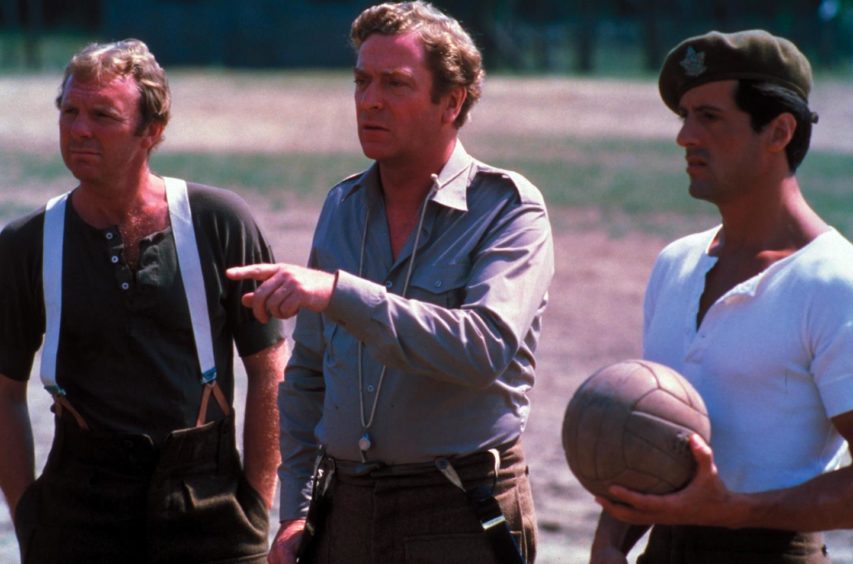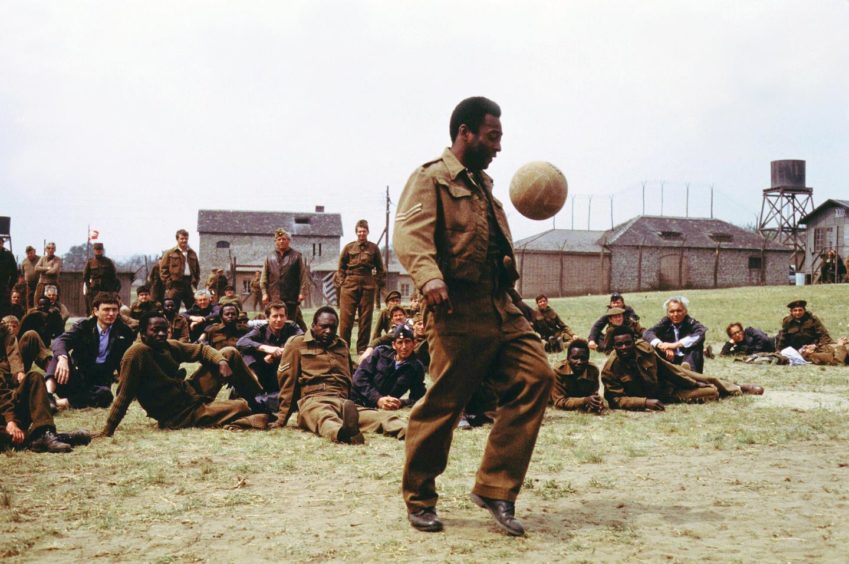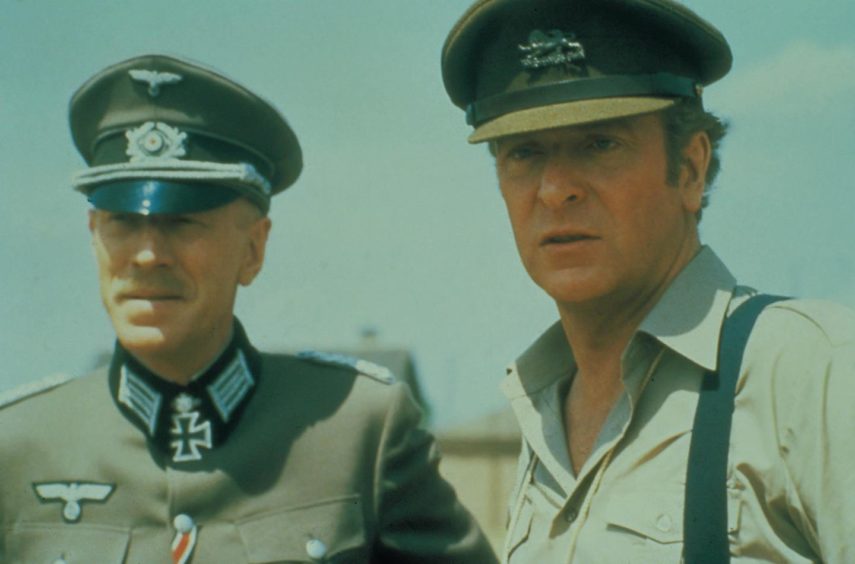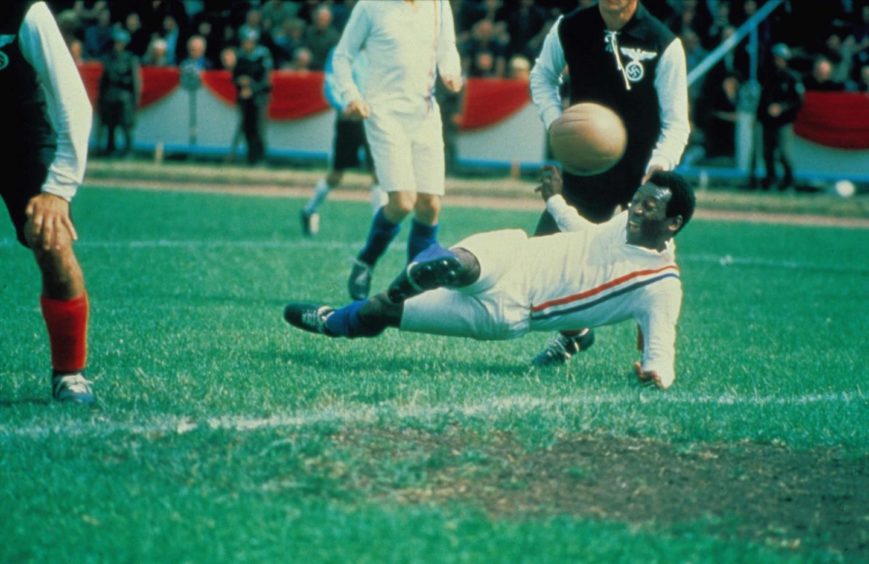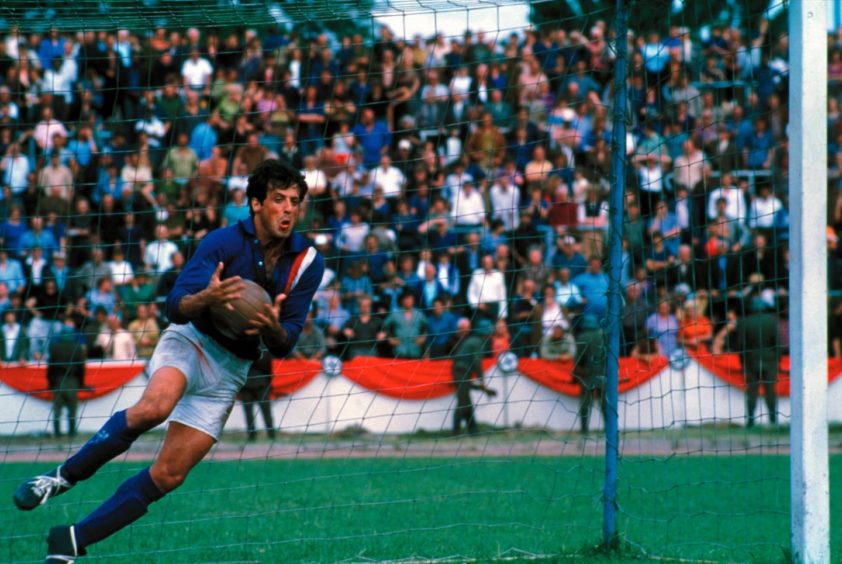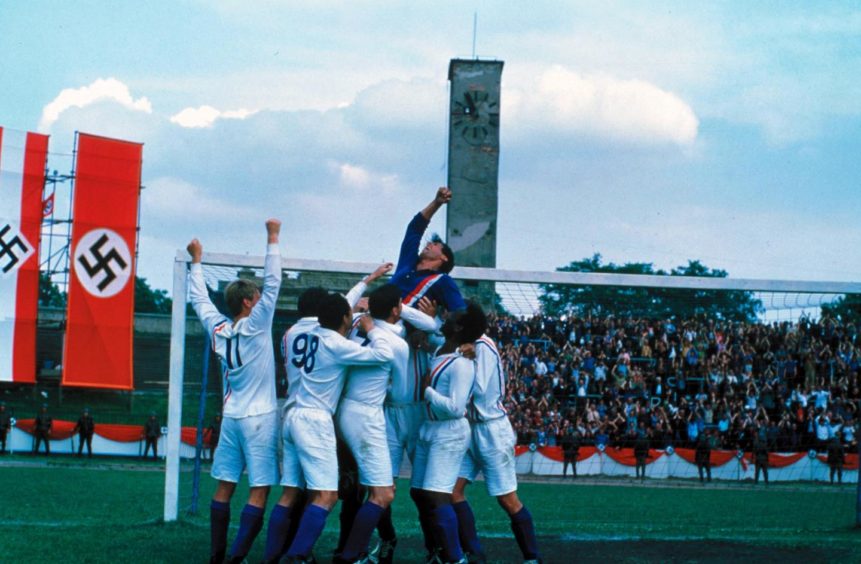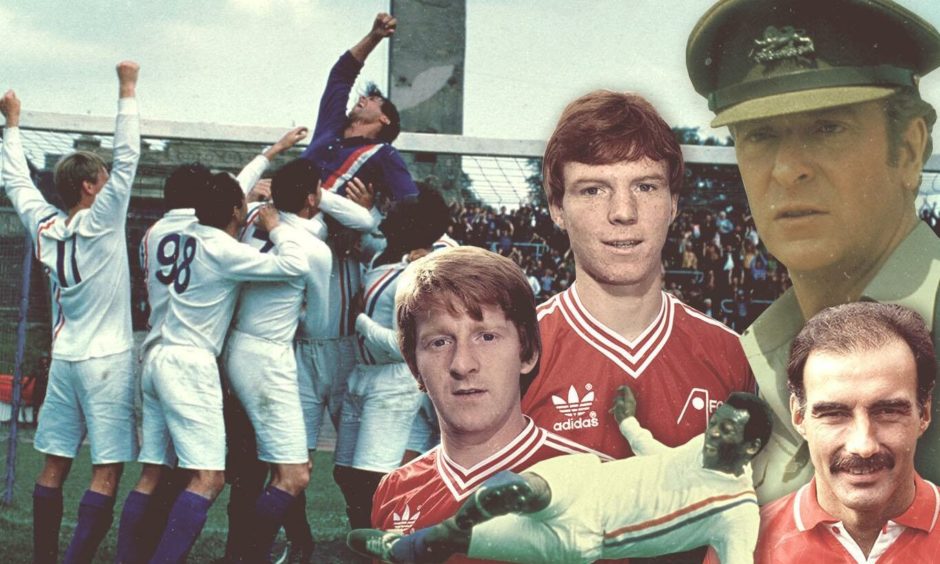
Aberdeen’s 1980 title-winning heroes missed out on the chance to take on the Nazis in the wartime football classic, Escape to Victory.
Alex McLeish, Willie Miller, Gordon Strachan and Steve Archibald were in the Scotland squad that embarked on an end-of-season trip to Hungary and Poland.
They lost both friendlies and the chance of sharing the stage with Sylvester Stallone, Michael Caine and Max Von Sydow.
Escape to Victory tells the story of Allied prisoners of war taking on their German captors in a football match in occupied Paris during the Second World War.
The movie was filmed in Budapest in the summer of 1980 and the pool of footballers used in the film was drawn from across the world.
But would the Allies’ team have been 4-1 down at half-time in the Colombes Stadium in 1942 with Aberdeen’s iconic McLeish-Miller partnership at the back?
McLeish said: “Jock Stein said that any of us who wanted could stay on after the tour game, as the film-makers were looking for extras for the football scenes.
“Pelé, Ossie Ardiles, Bobby Moore and Mike Summerbee were among the top-class footballers who took part and John Wark actually had a small speaking part.
“The idea quite appealed to me but at that time I had just started dating Jill and getting home proved a stronger magnet.
“But whenever I see that film nowadays, I wonder whether it could have been enhanced by the appearance of a certain red-headed Scotsman.
“Such are the dreams of fame and fortune!”
One Scotsman, however, did appear in the movie.
John Wark’s Ipswich side made up a large contingent of the extras, apparently due to someone in the film industry knowing manager Bobby Robson.
Wark said: “We thought we were just going there to play football.
“We didn’t realise that we would have speaking parts.
“It wasn’t until we got out there and we saw Pelé, Bobby Moore, Michael Caine, Sylvester Stallone, that we thought, ‘Oh my God, this is actually a proper movie!'”
Stallone, by then a megastar thanks to the success of Rocky, only got involved because he wanted to work with Huston, whose resume included The Maltese Falcon, Treasure Of The Sierra Madre and The African Queen.
Stallone made a series of outlandish demands, such as wanting to score the game’s winning goal, despite the fact this character played the goalkeeper.
Michael Caine plays Captain John Colby, whose career for West Ham was postponed because of the war.
After being captured and put into a POW camp, he organises football matches to pass the time.
Von Sydow, who plays “the good German” Von Steiner, hatches a plan to have a prisoners of war XI take on an all-star Nazi team.
“If nations could settle their differences on a football pitch, wouldn’t that be a challenge?” says Von Steiner to Colby, who accepts the challenge match on the proviso of getting better conditions for the prisoners.
When it turns out that the game will be played in Paris, the French Resistance agrees to help the team escape at half-time, while the Nazis try to fix the outcome with a bent referee and by stocking the Allies’ squad with a rag-tag selection of detainees.
The game seems all but lost when Pelé comes off with broken ribs against a roughhouse Nazi team that goes 4-0 up.
Bobby Moore pulls a goal back just before the break.
The French Resistance succeeds in digging a tunnel from the sewer system straight into the Allies’ dressing room to enable their escape at half-time.
Stallone starts to lead the men down the tunnel to safety when Ipswich and England defender Russell Osman delivers his iconic “We can win this!” line.
Mike Summerbee follows up Osman’s rousing team-talk as the ‘early bath’ escape beckons with: “It’s not as though we’re being slaughtered, skipper!”
“What do you mean we can win?” Caine replies. “You mean you’d go back and play the second-half?”
“Please, Hatch,” pleads Pelé as the players argue about going back.
“That game means a lot to us. You know that. You must go back.
“If we run now, we lose more than a game.”
The players go back out and attempt to overturn a 4-1 deficit against the strains of Rocky composer Bill Conti’s uplifting musical score.
The film’s final 20 minutes make for exhilarating viewing and Huston shows us the climax through the eyes of Von Steiner.
Ossie Ardiles pulls the score back to 4-2 before Manchester City’s Polish star Kazimierz Deyna scores a third Allied goal, to the delight of the French crowd.
The Allied comeback is almost complete when a shot hits the post and Russell Osman scores from the rebound but it is disallowed for offside.
The hobbling Pelé begs Caine to let him come back on with four minutes to go.
“I feel good,” he says. “I feel better. I must play.”
Pelé scores an overhead kick past the German goalkeeper in all its slow-motion glory, which is so good that even Von Steiner gets off his feet to applaud.
The film was released four years after Pelé played the last match of his career, which came for the New York Cosmos in 1977.
He retired with a record of 643 goals in 656 appearances.
But did he ever score a better goal?
Wark said: “If you look closely on Pelé’s goal at the end of the game, Bobby Moore is crossing the ball in.
“Bobby was one of the greatest defenders of all time.
“He wouldn’t be the guy crossing the ball in, but I guess they wanted him to be part of the final scene.
“It only took one take for Pelé to score that overhead kick.”
The score is now 4-4 but the Germans get a penalty.
Stallone manages to save the spot kick before the crowd breaks out of the stands and burst through the gates with the players lost in the melee to escape.
Disbelief needs to be suspended for the final stampede because most of the spectators are wearing 1970s clothes and have ’70s hairstyles.
Wark said: “The final scene was actually quite scary to shoot.
“The fans all run on the field, and it’s like a stampede, and we had to run with them. You were afraid that you might trip and get trampled.
“It was really scary. We’re footballers. We were trying just not to get injured right before we had to go back to our clubs. After that scene, we were done. I think we were in Hungary for six weeks.
“After the film came out, they had a premiere at Ipswich, and I was watching it with two of my team-mates. I told them, ‘Here come my lines!’
“I had two lines in the film, and when I heard them, I said, ‘Wait a minute. That’s an Edinburgh accent’.
“After all of that, they had dubbed my voice in the movie!”
What of Aberdeen’s 1980 title heroes who turned down the chance to appear?
McLeish, Miller and Strachan would have to wait another three years to conquer Europe, when Aberdeen won the Cup Winners’ Cup against Real Madrid.
McLeish finally made the silver screen with a small cameo in Stan and Ollie back in 2018, which was directed by Aberdeenshire-born Jon S Baird.
And Steve Archibald? He moved to Tottenham following Aberdeen’s league triumph, where he won the Uefa Cup in 1984 following victory over two legs against Anderlecht.
Also in the Tottenham side was a certain Ossie Ardiles, while the Anderlecht manager was his Allies’ team-mate Paul Van Himst from Belgium!
Escape to Victory doesn’t receive a mention in Huston’s autobiography.
He instead spoke of such notables as Hemingway, Hepburn, Welles, Gable, Bogart and Brando, rather than the thespian talents of Ardiles, Osman and Wark.
Some 40 years on, however, the film remains one of the cult classics of modern cinema.
More like this:
Steve Archibald followed in Diego Maradona’s boots at Barcelona
The forgotten story of how Dutch maestro Johan Cruyff almost played for Aberdeen
Sir Alex Ferguson: Aberdeen and Manchester United legend’s life in pictures
